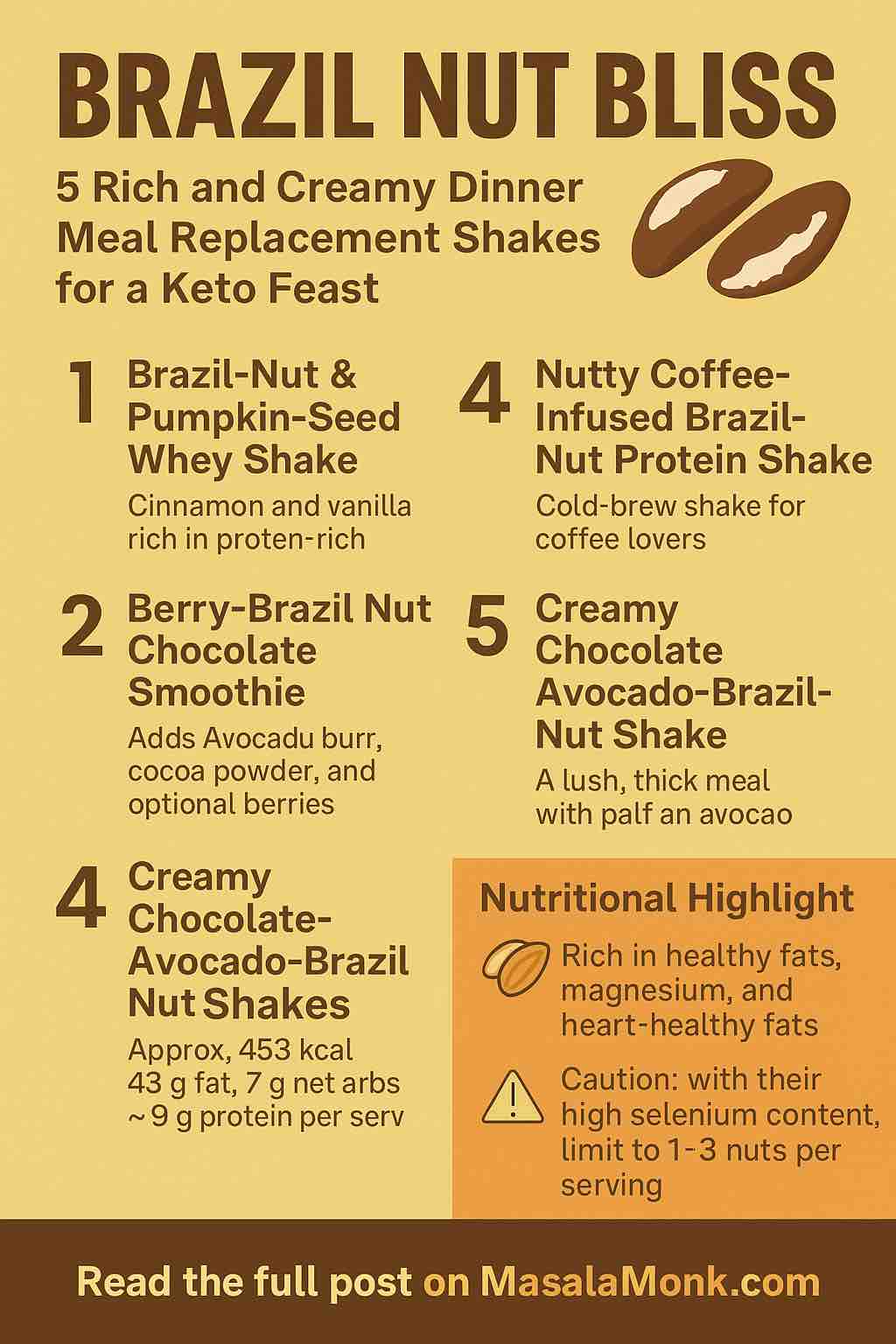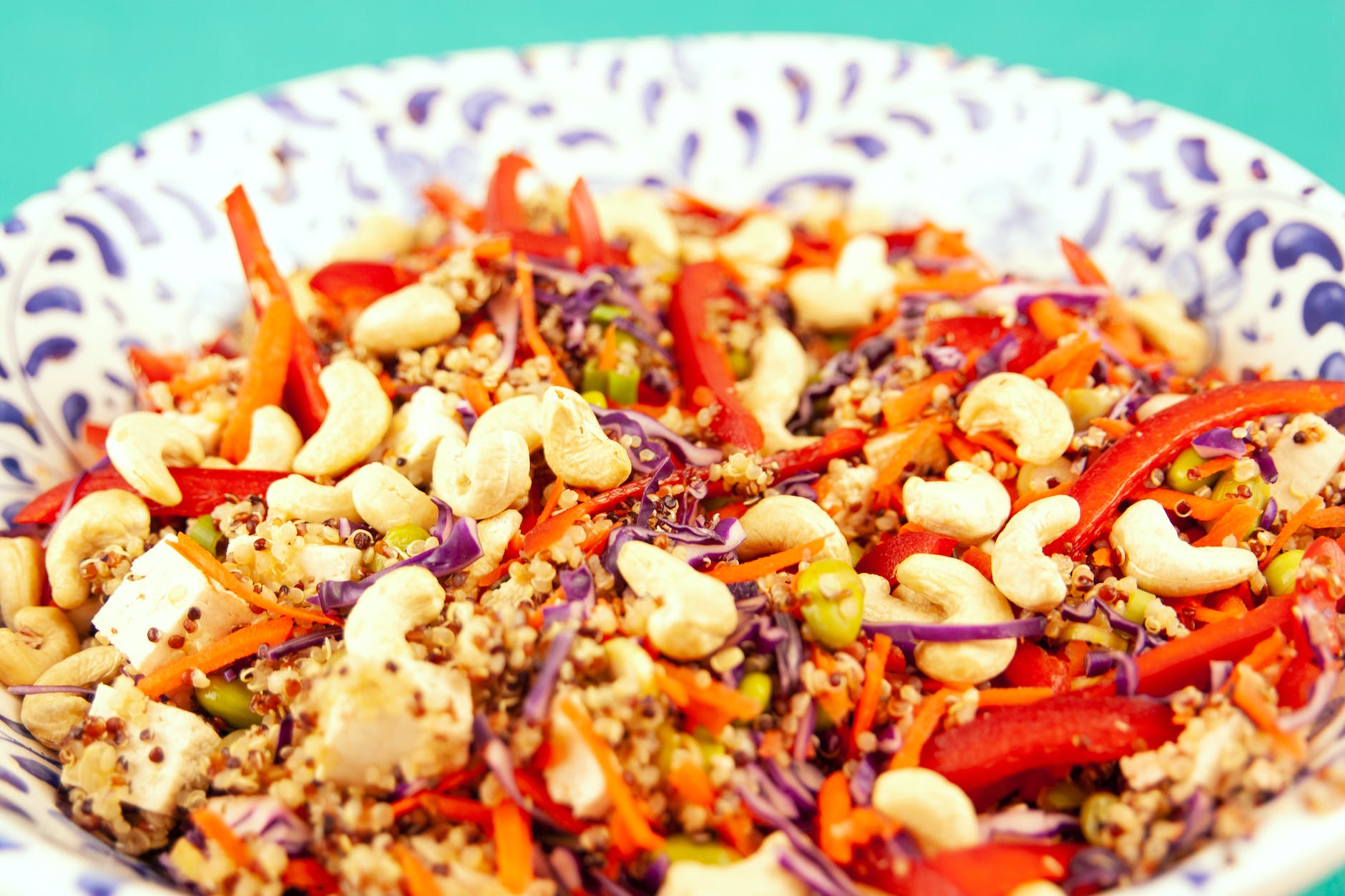
When you’re deep in ketosis and craving something creamy, filling, and quick for dinner, a shake can be your best friend. But not just any shake. We’re talking about luscious, satiating, nutrient-packed meal replacements powered by one of nature’s most underrated superfoods: the Brazil nut.
Rich in selenium, healthy fats, and buttery texture, Brazil nuts are perfect for keto. In this detailed guide, we’ll explore five indulgent yet nutritious dinner shakes that transform this humble nut into a keto-friendly feast. Plus, you’ll learn the nutritional science, practical tips, and health cautions that make Brazil nuts worth integrating mindfully into your routine.
Why Brazil Nuts Belong in Your Keto Shake
Brazil nuts are keto gold. Just 1–2 nuts a day provide your full recommended daily intake of selenium—a mineral crucial for thyroid function, immune health, and antioxidant defense. They’re high in monounsaturated fats, fiber, magnesium, vitamin E, and plant compounds like ellagic acid.
Key Nutritional Benefits:
- Selenium: 175% RDI per nut. Supports metabolism and reduces inflammation.
- Fats: Over 65% fat content, mostly heart-healthy mono- and polyunsaturated fats.
- Low Carbs: Only ~1g net carbs per 6 nuts.
Caution: Limit intake to 1–3 nuts or 1–2 tablespoons of Brazil nut butter per shake to avoid selenium overdose, which can cause nausea, fatigue, and other symptoms over time.
The Shake Strategy: What Makes a Keto Shake “Dinner-Worthy”?
For your shake to be a viable dinner replacement, it needs more than just calories—it must hit the right macro profile (high fat, moderate protein, low carb), have enough volume to satisfy, and ideally include micronutrients.
Components of a Balanced Keto Dinner Shake:
- Base: Unsweetened almond, coconut, or avocado milk; heavy cream for richness.
- Fats: Brazil nut butter, avocado, MCT oil, or seed butters.
- Protein: Whey isolate, collagen peptides, egg white, or vegan blends.
- Micros: Leafy greens, berries, spices, cocoa, or low-carb veggies.
- Flavor enhancers: Stevia, erythritol, cinnamon, vanilla, ginger, or cocoa.
🥤 Brazil Nut Bliss: 5 Meal Replacement Shakes
1. Chocolate Avocado Brazil Nut Shake
Thick, lush, and deeply satisfying.
- 1 cup unsweetened almond milk
- 1/2 cup heavy cream
- 1/2 avocado
- 6 Brazil nuts (or 2 tbsp Brazil nut butter)
- 2 tbsp cocoa powder
- 1 tbsp almond butter
- 1/2 tsp cinnamon, dash vanilla
- Stevia or monk fruit to taste
- Ice
Macros (approx.): 450 kcal | 43g fat | 9g protein | 6g net carbs
2. Nutty Mocha Meal Shake
Coffee meets creamy fat bomb.
- 1 cup cold brew coffee
- 1/2 cup coconut milk
- 1 scoop chocolate whey protein
- 1 tbsp Brazil nut butter
- 1/2 tsp cocoa powder
- Dash cinnamon
- Ice
Why it Works: Energizing, creamy, and rich in healthy fats and protein.
3. Green Brazil Nut Smoothie
Nutty, nutrient-dense, and slightly sweet.
- 1 cup almond milk
- Handful spinach
- 3 Brazil nuts
- 1/4 cup frozen berries (strawberries or blueberries)
- 1 tbsp chia seeds
- 1 scoop collagen peptides
- Stevia to taste
- Ice
Tip: The greens and berries provide antioxidants, while the nuts and chia add healthy fats and texture.
4. Pumpkin Spice Brazil Nut Shake
Creamy autumnal comfort in a cup.
- 1 cup unsweetened almond milk
- 2 tbsp pumpkin puree
- 1 tbsp Brazil nut butter
- 1/2 scoop vanilla protein powder
- 1/2 tsp pumpkin pie spice
- Pinch of sea salt
- Ice
Bonus: Rich in fiber, beta-carotene, and cozy fall flavors.
5. Coconut Berry Brazil Cream Shake
Bright, tropical, and luxurious.
- 1/2 cup full-fat coconut milk
- 1/2 cup almond milk
- 2 tbsp Brazil nut butter
- 1/4 cup mixed berries
- 1 scoop vanilla protein
- 1 tbsp ground flaxseed
- Sweetener and ice
Great for: A lighter but filling dinner alternative with tropical notes.
Practical Tips
- Portion Smart: Stick to ~1–2 tbsp Brazil nut butter or 2–3 nuts per shake.
- Balance Your Day: If selenium from other sources (eggs, meat) is high, limit Brazil nut intake.
- Storage: Shakes stay fresh in the fridge up to 48 hours. Shake or blend again before consuming.
- Prep Ahead: Portion ingredients into freezer bags for grab-and-blend convenience.
Final Word
Keto doesn’t mean compromise—it’s about crafting delicious, intentional meals that nourish. These Brazil-nut-infused dinner shakes hit every mark: high in healthy fats, full of flavor, and nutritionally smart. Just one creamy glass can feel like a feast, making your keto dinner as blissful as it is effortless.
Ready to blend? Your keto dinner revolution starts with a nut.
✅ Frequently Asked Questions (FAQs)
1. How many Brazil nuts are safe to eat per day on keto?
Answer: Limit to 1–3 whole Brazil nuts daily, or about 1–2 tablespoons of Brazil nut butter. This avoids excess selenium, which can be harmful in high doses.
2. Can I replace Brazil nuts with another nut or seed?
Answer: Yes. Macadamia nuts, pecans, or sunflower seed butter are good low-carb alternatives, though they won’t provide the same selenium content.
3. Are these shakes suitable for weight loss on keto?
Answer: Yes, if you manage portion sizes and total daily calories. These shakes are designed to be filling and nutrient-dense, supporting satiety and fat adaptation.
4. Can I make these shakes dairy-free?
Answer: Absolutely. Use coconut or almond milk, omit heavy cream, and choose a plant-based protein powder to keep it dairy-free.
5. Are Brazil nuts safe to eat every day?
Answer: Yes, in moderation. Daily intake should stay below 400 µg of selenium—equivalent to about 1–2 nuts. Regular overconsumption can lead to selenium toxicity.
6. How long can I store these shakes?
Answer: Most shakes will stay fresh in the fridge for up to 48 hours. Shake or re-blend before serving. Avoid freezing if using dairy, as texture may change.
7. Can I add greens or veggies to these shakes?
Answer: Yes! Spinach, kale, or cauliflower rice add fiber and nutrients without many carbs. They pair well with Brazil nut butter for a creamier texture.
8. What protein powders work best for these recipes?
Answer: Whey isolate, collagen peptides, or unsweetened vegan protein powders (pea, hemp, or rice) are all keto-compatible. Avoid powders with added sugar or maltodextrin.
9. Will these shakes break a fast?
Answer: Yes. They are intended as full meal replacements, rich in fat and calories. If you’re looking for a fasting-friendly option, skip added fats and protein.
10. How can I make the shakes thicker and creamier?
Answer: Add avocado, ice cubes, frozen cauliflower, chia seeds, or use coconut cream/heavy cream. These add body without raising carb counts significantly.













